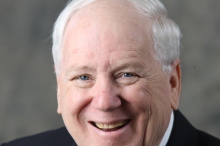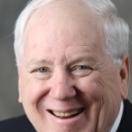
 Former Ambassador Kenneth M Quinn is being honored as a Champion of Change for strengthening food security.
Former Ambassador Kenneth M Quinn is being honored as a Champion of Change for strengthening food security.
For the past 12 years, it has been my privilege to build upon the legacy of one of the single greatest "champions of change" that the world has ever known --Dr. Norman E. Borlaug. Known as the man who saved more lives than anyone who has ever lived, Dr. Borlaug passed away in 2009. His work to confront global hunger carries on through the World Food Prize Foundation that he founded and I lead.
Born on a farm in northeast Iowa in 1914, Norman Borlaug became a plant pathologist who, while working among the poorest farmers in Mexico in the 1940s and 50s, developed a new "miracle wheat" which was able to resist disease and triple the yield. In the 1960s, he went to India and Pakistan, which were facing imminent mass starvation, and convinced the leaders of both countries to adopt his new approach to agriculture using the new seeds that he had developed. In just five years both countries went from facing extreme deprivation to self-sufficiency and even surpluses. Hundreds of millions of lives were saved, which led to his being awarded the Nobel Peace Prize in 1970 and given the appellation the father of the green revolution.
When the Nobel committee was not willing to follow his suggestion of the creation of a new Nobel Prize for Agriculture, Dr. Borlaug created his own award. In 1986, the World Food Prize was established. Over the past 25 years, the World Food Prize has grown to become the foremost international award for individuals who have made exceptional breakthrough achievements in increasing the quality, quantity and availability of food in the world, thus reducing hunger. A truly global award, laureates have come from a wide array of countries, ranging from Bangladesh and Brazil to Sierra Leone and Denmark. In 2012, the World Food Prize will be presented to a citizen of Israel, Dr. Daniel Hillel, who was among the pioneers who developed micro-irrigation. Alongside the World Food Prize ceremony, we also hold the Borlaug Dialogue, an internationally renowned three-day conference on global agriculture and a day-long Iowa Hunger Summit focusing on grassroots solutions to hunger at home and abroad.
Dr. Borlaug's favorite part the World Food Prize events was the Global Youth Institute. We bring 150 high school students and an equal number of teachers to participate in the symposium each year, where students also present their own research papers. From that group, 20 are selected to become Borlaug-Ruan International Interns, sent to a wide array of international agricultural research centers each summer for hands-on assignment working on some facet of confronting hunger through science. These life-changing experiences then lead to college- level internships at the U.S. Department of Agriculture in the new Wallace-Carver internship program established by USDA Secretary Tom Vilsack in conjunction with the World Food Prize Foundation.
Dr. Norman Borlaug is one of only three Americans to ever win the Nobel Peace Prize, the Congressional Gold Medal (America's highest civilian honor) and the Presidential Medal of Freedom. Even though Dr. Borlaug is gone, the World Food Prize serves as an enduring tribute to him, and the recently opened Hall of Laureates in Des Moines is a place of inspiration for all from around the world to visit, learn, and be inspired by his motivation to confront and defeat hunger.
After completing my diplomatic career with the U.S State Department by serving as U.S. Ambassador to Cambodia, I returned home to Iowa to take over the leadership of the World Food Prize Foundation in 2000. With a staff of just two, we began our efforts to build the World Food Prize to reflect Dr. Borlaug's dreams that it could come to be seen as the "Nobel Prize for Food and Agriculture." Now we have a staff of 10 and attract more than 1,400 guests from 75 countries for a weeklong series of events around the prize. Fueled by Dr. Borlaug’s inspiration, we are increasingly moving toward fulfilling his vision that the World Food Prize recognize and inspire Nobel-like achievements, and that we inspire the next generation so that one day we can celebrate the eradication of hunger and poverty from the face of the earth.
Kenneth M Quinn is the President of the World Food Prize foundation in Des Moines, Iowa and former U.S. Ambassador to Cambodia


